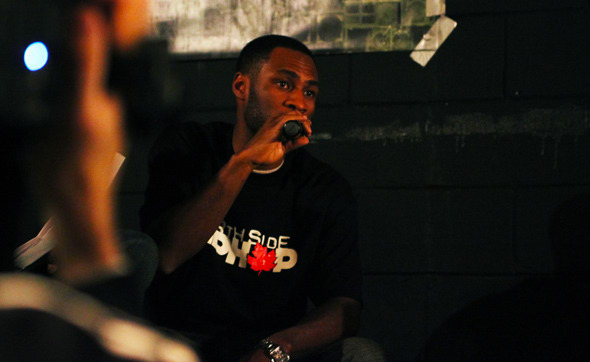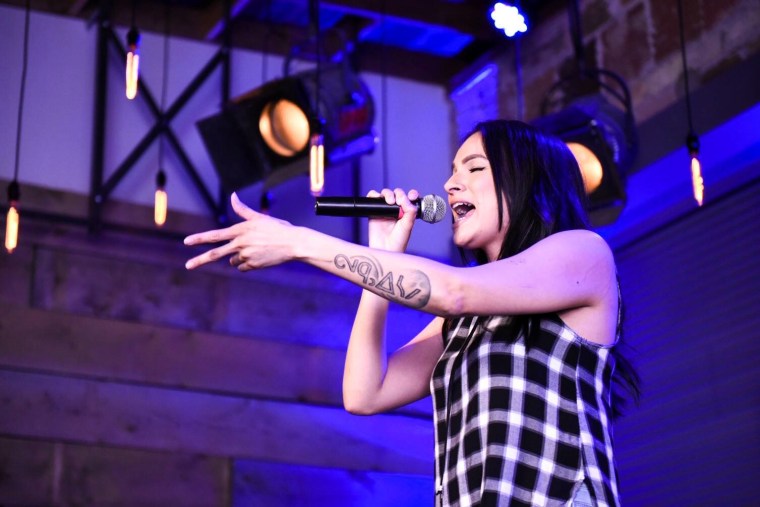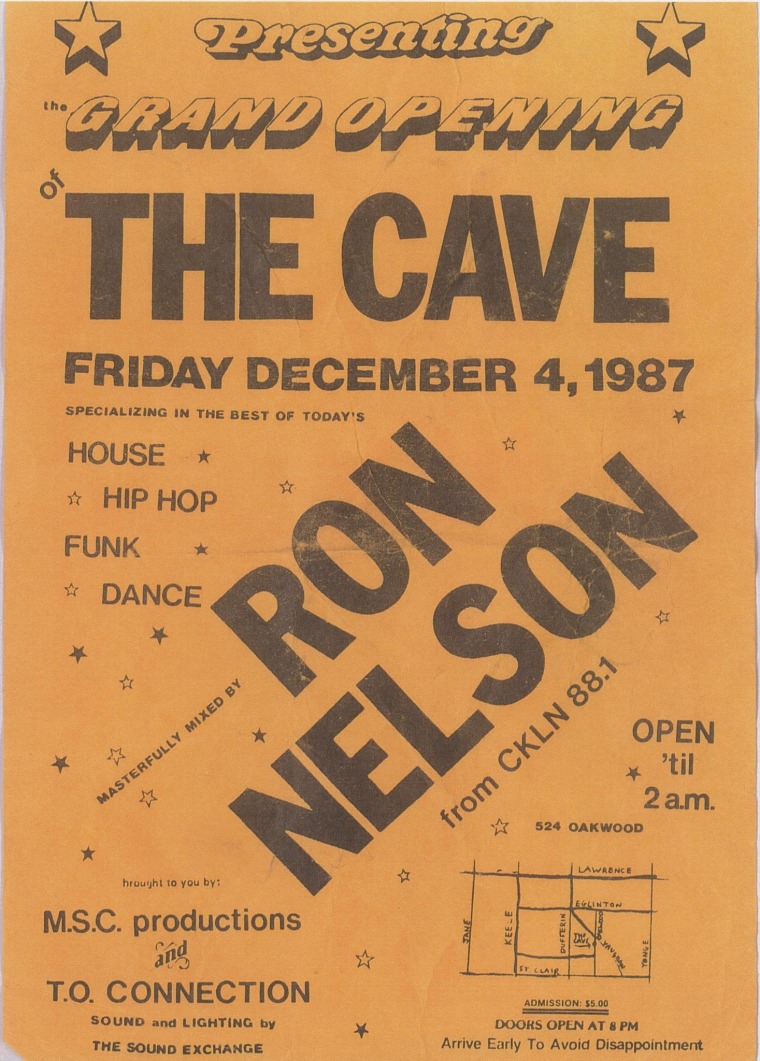 Mark Campbell
Photo via www.markvcampbell.ca
Mark Campbell
Photo via www.markvcampbell.ca
Canada is cool everywhere except in Canada, and Mark Campbell just wants his country to catch up to what the rest of the world believes. An adjunct professor at Ryerson University’s School of Media and a Senior Research Associate at the FCAD Forum for Cultural Strategies, Campbell's sustained academic career stems from a lifelong devotion to hip-hop. He DJ’d as a teen, hosted two shows in the ‘90s on campus and community radio, and, in 2009, founded the Northside Hip Hop Archive to digitally preserve a culture that gave him so much.
This March, Campbell toured the Archive across Canada. The I Was There! tour, which stopped in cities like Toronto, Hamilton, Montreal, and Saskatoon, paid tribute to the Canadians who introduced hip-hop to the country and continue to preserve it as a method of cultural identity and social solidarity. The excursion wasn’t an indulgent nostalgia trip, or a therapy session for bitter old heads. Instead it was constructive: by highlighting overlooked history, Campbell hopes to erase the inadequacies Canadians perceive in their own culture, with the hope that individuals and institutions will start to boost artists at every level. When I met Campbell for coffee near Ryerson's campus in downtown Toronto after the Archive’s seven-date tour, he was convinced that hip-hop is uniquely placed to achieve this. “Self-worth, a sense of social cohesion, a sense of belonging; all those things come out of hip-hop,” he said. “One of the things I would argue until my grave is that that's why hip-hop’s still around.”
The FADER spoke to Campbell about the biggest lessons he learned from the tour, and his ongoing ambition to get Canadians to rep their set.
What inspired this tour?
In the mid '90s, [Toronto] had these street magazines that you could pick up on the subway and just read about what's happening in local hip-hop culture. When the internet came, those things all disappeared. It didn't become digitized. This project is about giving elders in the community a platform or stage, conference or keynote lecture to tell us what it was like when they were there.
What were some of the biggest lessons you took away from the tour?
On March 9, we started in Montreal. [Pioneering Montreal DJ] Butcher T was the guy that we honored. What I learned was that in the '70s, this guy was finding his own way to New York to just witness this thing called hip-hop. There was no marketing, no infrastructure — he was just a kid that was excited about what he saw, and he brought that back to Montreal.
There was a whole generation of people who would come to Canada, and their kids would have been the first audiences for hip-hop. We were the first international location where artists like Biz Markie, LL Cool J, Run DMC, Salt N' Pepa, and Queen Latifah could test out material and build audiences. Montreal had a lot of Caribbean young people, and those audiences came from a musical culture where it was participatory; you don't sit down and clap, you jump up and down, you throw bottles, you boo people off stage. It was like the Apollo, in that sense, but it was Caribbean young kids here in Toronto that would have been the vital spark.
Giving artists money doesn’t necessarily develop them. Cultivating audiences helps develop them, providing exposure to international scenes helps develop them.
 T-Rhyme
Photo by Leilah Dhoré
T-Rhyme
Photo by Leilah Dhoré
We moved onto Saskatoon and celebrated Eekwol. She is all about empowering and uplifting indigenous women. Someone like her, we call them 'architect.’ She was able to problematize and force [the community] to rethink settler colonialism, and how we're participating in it, even through hip-hop. She was able to give us a kind of ethic, to continue to work at not reproducing the same conditions we live in. The native communities in Canada are doing the most exciting hip-hop in this country now, because it has a social application. Proposed legislation [couldn’t] make these young people feel like they don't belong to Canada. You could with hip-hop.
Here in Toronto we had a panel discussion about hip-hop radio, and Ron Nelson [host of “Fantastic Voyage,” the first hip-hop radio show in Canada] gave the keynote. If you really want to know about resistance, look at the difference between the development of the American hip-hop industry and the development of the Canadian hip-hop industry. If you turn on a commercial radio today in Toronto, you almost can't even hear Drake. He’s the biggest name in the world! If you're not gonna support the biggest pop-star in the world, how are folks like KAYTRANADA supposed to come up? For some of [the radio stations], if it's a black artist, they assume that the audience has to be black. Radio is a reflection of the music industry. If the music industry in the city doesn't take a risk on an artist, then the radio won't either.
Once the problems were articulated, were possible solutions identified?
I think that this is the beginning of a conversation. We were just hearing what the state of the problem is. I sit on a bunch of different arts councils. Giving artists money doesn't necessarily develop them. Cultivating audiences helps develop them, providing exposure to international scenes helps develop them. Something like a college radio station is absolutely critical. As a DJ on the radio, I'd have guys all the time come and bring music and say, "What do you think? Are you gonna put it in your mix? Should I give you a clean version? Should add 8-bar loop at the beginning? Are you gonna mix it in? Do you want an acapella?" All those things, those are really critical parts of how you develop culture that we're missing.
The other big key we're missing now is [professional development]. Master T [VJ and host of the Much Music show Rap City], would literally say to cats, ‘your stuff isn't ready yet. Do this, this, and this, and you can come onto my show.’ That was professional development. It was learning how to write an EPK. How to get the right lighting in your photos. What font to use when you're communicating with press. It was very organic, and people that were involved in the culture were doing it without any kind of incentive, because it was part of the creative eco-system. Now, that’s gone.
We didn't arrive when Drake emerged; all those people were scaffolded on top of a scene of promoters, radio shows, DJs, and audiences. The biggest lesson that Canada needs to feel proud about is that we're not the new kids on the block: We have layers and layers of history that demonstrate we've been doing the work.
 Flyer via archives of Carlito
Flyer via archives of Carlito